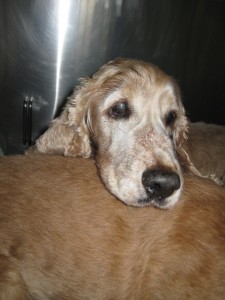 The thyroid gland regulates the body’s metabolic rate. When it slows down the whole body slows down.
The thyroid gland regulates the body’s metabolic rate. When it slows down the whole body slows down.
Hypothyroidism is a deficiency in production of the thyroid hormone. This deficiency is caused by immune-mediated destruction of the thyroid gland, most commonly, or by natural atrophy of the gland.
Signs of hypothyroidism include:
- Weight gain
- Lethargy
- Cold intolerance
- Dry coat and excessive shedding of hair
- Very thin coat
- Increased pigmentation of the skin
- Failure to re-grow hair after clipping or shaving
- A tragic expression because of thickening of the facial skin
- Abnormal nerve function exhibited as non-painful lameness, dragging of the feet, lack of co-ordination and a head tilt
- Loss of libido and infertility in intact males
- Lack of heat periods, infertility, and abortion in females
- Spots on the eyes
- Dry eye because of inadequate tear production.
- Anaemia
The thyroid glands are located in the neck either side of the trachea or windpipe. They are controlled by the body’s master gland, the pituitary gland, located at the base of the brain.
To confirm hypothyroidism we test blood to see if T4, the main thyroid hormone, is low. Unfortunately, dogs sick for some other reason or taking certain drugs like seizure medications, may have low levels too. Confirmation of hypothyroidism sometimes requires an additional test.
Hypothyroidism is treated daily with tablets containing a thyroid replacement hormone, thyroxine, for the rest of the dog’s life.
We check T4 levels again after a month of treatment to make sure we are giving the right dose. We test 4-6 hours after the morning dose. T4 levels are then checked every 6 months and the dose adjusted if necessary.
Overdosing produces signs of hyperthyroidism including hyperactivity, lack of sleep, weight loss, panting, nervousness, aggressive behaviour and an increase in water consumption. If any of these occur, please let us know immediately.
